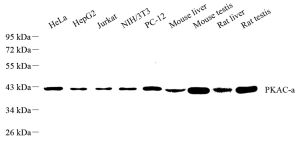Anti-PKA alpha+beta (catalytic subunits) Rabbit pAb (100 μl)
| Reactivity: | H,M,R |
| Applications: | WB |
| Host Species: | Rabbit |
| Clonality: | Polyclonal |
| Full Name: | PKA alpha+beta (catalytic subunits) rabbit polyclonal antibody |
Gene Name: | cAMP-dependent protein kinase catalytic subunit alpha |
Synonyms: | PRKACA, PKACA, PPNAD4, Protein kinase cAMP-activated catalytic subunit alpha, PKA C-α, PKA C, cAMP Protein Kinase Catalytic subunit |
Immunogen: | Recombinant protein corresponding to Mouse PKA alpha+beta |
Isotype: | IgG |
Purity: | Affinity purification |
Predicted MW. | 41 kDa |
Observed MW. | 41 kDa |
Uniprot ID: | P17612, P05132, P27791 |
Product Usage Information
Applications | Species | Dilution | Positive tissue |
WB | Human, Mouse, Rat | 1: 500-1: 1000 | liver, testis |
Background
The catalytic subunit α of protein kinase A is a key regulatory enzyme that in humans is encoded by the PRKACA gene. This enzyme is responsible for phosphorylating other proteins and substrates, changing their activity. Protein kinase A catalytic subunit (PKA Cα) is a member of the AGC kinase family (protein kinases A, G, and C), and contributes to the control of cellular processes that include glucose metabolism, cell division, and contextual memory. PKA Cα is part of a larger protein complex that is responsible for controlling when and where proteins are phosphorylated. Defective regulation of PKA holoenzyme activity has been linked to the progression of cardiovascular disease, certain endocrine disorders and cancers.
Images
|
Western blot analysis of PKAC-a (GB11598) at dilution of 1: 500 |
Storage
| Storage | Store at -20°C for one year. Avoid repeated freeze/ thaw cycles. |
| Storage Buffer | PBS with 0.02% sodium azide, 100 μg/ml BSA and 50% glycerol. |

